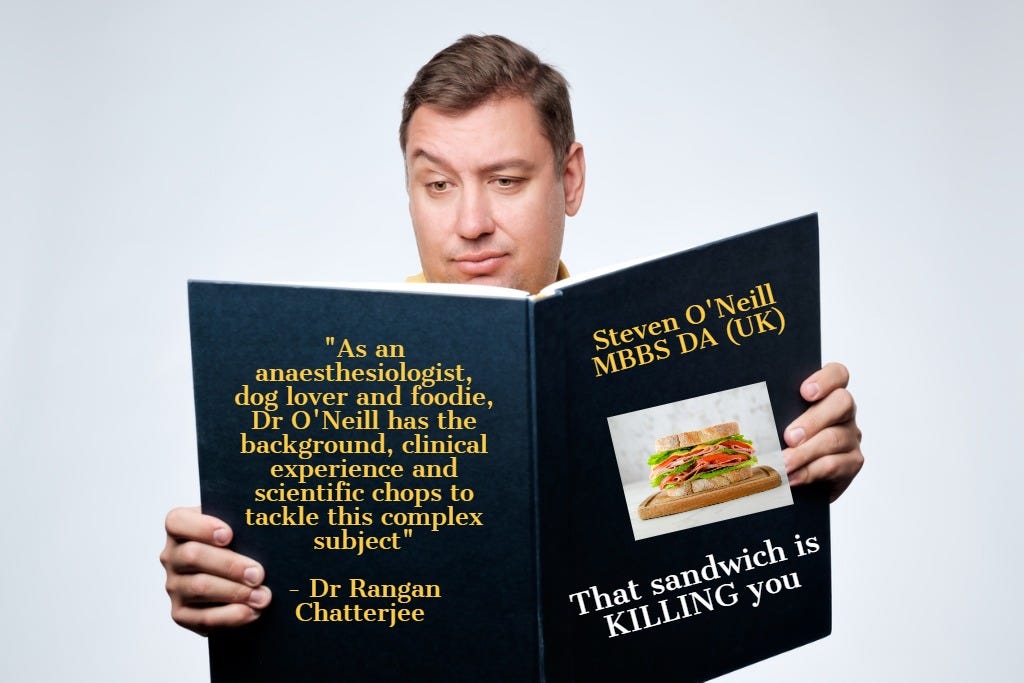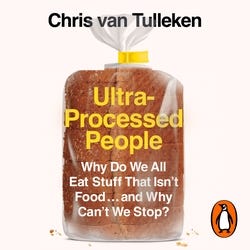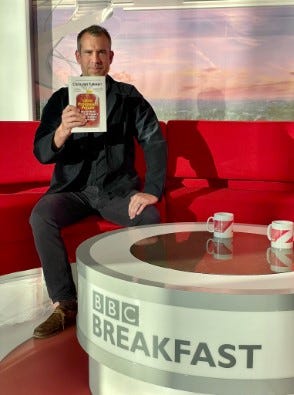Conflicts of interest part 2
FAME!
Disclaimer: I probably have a strong bias when writing this post. I have been a registered dietitian for 15 years. And every year or two throughout my career, there’s always been a doctor who gets bored of medicine, gets into nutrition, writes an over-simplified book about “it”, and through the combined influence of “he’s got a penis, and an MD?!”, a powerful agent, and a media eager for some exciting new headlines on food, that “it” becomes a thing.
Chris Van Tulleken likes to spend every interview stating that conflicted nutrition scientists are the reason we have bad nutrition policy; and more specifically, the reason many of us haven’t jumped on the JESUS-CHRIST-THIS-SANDWICH-HAS-GOT-11-INGREDIENTS bandwagon, is because we’ve been “bought” by food industry.
I hope to demonstrate in this longer-than-usual post that the reason I don’t think we should stick warning labels on every UPF is because I’ve spent the last 10 years reading empirical data while Chris has been on the phone to his agent.
I also want to demonstrate why I think a desire to be on the telly has a greater perverting influence on what people are willing to say or do than the fact that Marlow Foods gave someone’s nutrition department £1500 to sponsor a seminar once.
Here’s my brief* review of the current evidence on UPFs and health:
Observational data show consumption of UPFs is associated with bad stuff (the list is LONG). But when the UPFs are separated out into categories, some UPFs like breads and cereals are not associated with risk, or are associated with a reduction in risk of disease.
Kevin Hall’s now-famous RCT compares a diet where 80% of calories come from UPFs and one where 90% calories come from unprocessed foods. People spontaneously ate 500kcal more on the UPF diet. However, the UPF diet basically lacked fresh fruit or veg (I’ll come to why this is important below). In fact, the difference in fresh fruit and veg between the diets is staggering:
Here are the snacks:
What about additives? Some studies that show that artificial sweeteners are related to stuff like CVD. On the other hand others don’t. Inconsistent results are a red flag in science because a lack of reproducibility suggests that a positive finding might just be a false positive.
A few studies show that additives change the microbiome, but “changes the microbiome” is a meaningless outcome unless you define what changes you’re looking for from the outset.
In a very high-quality mechanistic study, 15g of carboxymethylcellulose (quite a lot) a day causes changes in the fecal metabolome (like the microbiome, a pretty non-specific finding). In 2 out of 7 (29%) people (but no change on average) there looked to be “increased microbiota encroachment into the normally sterile inner mucus layer”….which is a feature associated with inflammatory gut disease. It’s a small, excellently-done, hypothesis-generating study. But it doesn’t show, -and wasn’t designed to show - that carboxymethylcellulose causes inflammation of the gut. And the authors themselves note “If our results are confirmed in larger studies…”.
If you’ve been around for a while you’ll know that preliminary findings (whether beneficial or harmful) from early phase science rarely pan out when studied further.
My reading of other additive and gastrointestinal disease studies is basically the same - small, interesting trials which - even if they look like they’ve been powered properly -have large error bars and marginal statistical significance.
Let me know if you think I have missed any key studies but this is how I would objectively summarise the evidence:
“Some UPFs are associated with ill health, some with good health, and some are neutral; diets devoid of fresh fruit and veg are a bad idea; there are some studies which do, and some studies which don’t suggest additives are bad; and small exploratory studies suggest that some additives might (but might not) cause or worsen inflammatory gut disease”.
But there’s more…..
If your interest is in structuring a compelling narrative (and landing another media interview), you are less likely to go looking for research that reduces the impact of your argument.
The UPF diet in Kevin Hall’s RCT had an energy density that was about twice that of the unprocessed diet. Energy density is measured by the number of kcals per gram of food. When people consume a diet that is energy dense, they tend to spontaneously over-consume calories:

And guess what lowers the energy density of meals? ADDING VEGETABLES!
This is where the absence of whole fruit and veg in the “ultraprocessed” group becomes important.
So I look at those photos of the UPF diet in Kevin Hall’s study and ask myself “what would happen if servings of veges were added to those meals, would the participants have eaten less?”.
Barbara Rolls has done some work to help answer this question. Her team took the following menus (pretty high in UPFs) and manipulated the energy density, primarily by increasing the proportion of veges. Eg for the main dinners, they basically replaced some of the pasta concoction with veges.

They found that people spontaneously consumed way fewer calories when the energy density was lowered (largely as a result of adding veges to the meals):

So maybe if the UPF and unprocessed diets in Kevin Hall’s RCT both had five servings of good old-fashioned fruit and veg there might not of been any differences in calorie intake**?
And there’s more….
Talking about trade-offs is boring and it’s not going to get you on the BBC breakfast couch
I don’t think we want to discourage the consumption of foods that might have benefits because we have applied a misguided label to a diverse group of foods.
And Chris is going to need a loaf of Hovis to use as a stress ball to deal with this one: some UPFs have benefits.
Chris talks emotively about the destruction of the Amazon for growing soy in his book. He writes correctly that most of the soy is used to feed animals which we then eat, and sort of links this up to the UPF industry.
But he fails to mention explicitly (as I think he should) that beef, animal meat and dairy are - by orders of magnitude - the most environmentally detrimental foods we consume. (And I am pretty sure a lot/most? of the beef and dairy we consume is unprocessed***)
UPF Benefit 1: Plant-based meats and milks have a much lower carbon footprint than meat and dairy.

So, many people like me choose to consume plant-based meat and plant-based milk because we want to reduce the environmental impact of our food choices on the planet. Of course, plant based milk and meat meet the definition of a UPF.
I hope you can see how lumping soy milk or a pea-protein burger (which - based on the observational data and what we know about their energy density - are fine) into the same broad category as Skittles, Red Bull and Doritos - and then warning people off all of them might seem like the kind of thing that's great for selling a book, but in practice is a foolish idea that is going to hinder our efforts to save the planet.
UPF Benefit 2:
I mentioned the case of micronutrient fortification in my original post on UPFs and I'll emphasise the importance of folate here.
Suboptimal folate status is a major concern in the UK. Folate deficiency causes neural tube defects. While guidance is for women of child-bearing age to supplement with folic acid when planning a pregnancy, 50% of pregnancies are unplanned. Fortified breakfast cereals provide about 27% of the daily requirement for folate in the UK, but intakes are too low and are declining.
Against this background do we really want to warn people off fortified (UPF) breakfast cereals? And just FYI it’s possible that some “whole food” (eg low carb) diets might put people at risk of deficiency.
Instead of considering or acknowledging these benefits and trade-offs, Chris thinks anyone who disagrees with him does so because Nestlé gave them a travel grant in 1998.
And there’s more….
The difference between a scientist and a celebrity doctor
A month ago Chris confidently informed a Guardian journalist about the dangers of supermarket bread stating “[Supermarket bread] will have high energy density because it’s very dry [low water content]... And will be extremely soft meaning you eat it quicker and consume the calories before you become full.”
This type of food science is not my specialism but I read this thinking “ok I can believe that’s true, but has anyone actually measured this..?”
So I did a search. I only found one study. It was done in France and compared 10 types of industrial, 6 artesanal, and 8 homemade breads. They found no difference in softness*****, energy density or the water content between the types of breads.
Now, this is one study, it's done in France….Would other studies if they were done in the UK find different? Perhaps. You can see how I am acknowledging uncertainty here.
But why wouldn't Chris look at this study, cite empirical data or acknowledge uncertainty?
In fact, why wouldn’t Chris say “yes this UPF diet did cause weight gain but hold on a second there was basically no fresh fruit and veg in it”.
Why wouldn’t he say “I hypothesise that people would consume more UPF ice cream than regular ice cream, but there’s no empirical evidence for this yet”
Why wouldn’t he say “UPFs like plant-based meat might help people consume less of the [mostly unprocessed] food group which has the greatest greenhouse gas emissions by orders of magnitude?”
Why?
THIS KIND OF GROWN-UP TALK IS NOT GOING TO GET YOU ON THE TELLY!

Why is wanting to be famous a massive conflict of interest?
You’re not going to become a media darling by boring people about eating more fruit and veg and fewer takeouts.
Back in 2010, 1000 British medical doctors 16 year olds were asked the question "What would you like to do for your career?", and 54 per cent answered "Become a celebrity".
If you’re a doctor and want to be on the telly, do you write about medicine? No because noone cares about vascular homeostasis. You need to get into nutrition.
But why not write about the harms of takeaways, cakes and doughnuts, and the benefits of fruit and veg? Um, it’s boring and old-fashioned isn’t it?
And 99% of journalists and producers will be straight up and tell you they are not interested in anything that’s not new.
So Tim Spector has become the nation’s favourite dietary guru by helpfully informing people that everything we know about diet is wrong, and we should have our poo analysed to tell us what we really should eat.
Rangan Chatterjee chucked in being a GP to get the country focussed on stuff like cold showers, saunas, nasal breathing and of course - the dangers of glucose spikes.
And remember Aseem Malhotra? He went from “no sugar” to “no carb” to “no vaccines”. He’s probably in the studio with Joe Rogan as we speak.
I’m not saying we know all UPFs are fine or healthy. We should absolutely continue to do research on the potential impact of stuff like additives on appetite, metabolism, mental health and the gastrointestinal tract to test all of these hypotheses.
But that we consume too much high-calorie, high-sugar foods and not enough fruit and vegetables is not a hypothesis.
So let’s fix this stuff with decent policy now. What policy you ask?
Chris suggests warning labels might be helpful. As I noted in my last post, providing information mostly does diddly-squat to influence food purchasing and consumption.
What does reliably change food purchasing and intake is pricing. If chocolate bars or fries or doughnuts increase in price, people consume less. So if we want to improve people’s diets this is one of the ways that would work. And we could use the money to subsidise healthier foods - maybe whole fruits and veg?!
Would this be hellish to do? Yes. There is no way we could do it without the public’s support. You can bet food industry would fight against it every step of the way.
But let’s propose a world in which celebrity doctors - instead of churning out content on the microbiome, saunas, nasal breathing, glucose spikes- used their authoritative, I’ve-got-a-penis-and-an-MD voices to repeat over and over again that we eat too many cakes, too many takeaways, too many chips, too many sweets; we drink too many soft drinks, and we don’t eat enough fresh fruit and veg. And that this can only change with effective - and it has to be dramatic - intervention.
But they don’t do this, because the old isn’t new.
So the next time you see a doctor on the telly with a new explanation [no silly its not the 3000kcal fish n chips] for why we’re all sick, there’s a new conflict of interest you should ask them about:
Do they have an agent?
*I’ll probably write a longer piece on this in the future.
**There actually is a study being done on this now - it looks underpowered IMO but it should be interesting and is very well designed. Of course, if this study shows UPFs cause weight gain (even when the diet matches fruit and veg) it will of course change my mind and I will update my views.
***I couldn’t find definitive data for this, but it looks like it here. Let me know if I am wrong.
****I’m not a food scientists but I think Young’s modulus which they used in this study is a measure of hardness vs softness.
OH I SHOULD ALSO ADD I HAVE A LOAD OF CONFLICTS OF INTEREST:
Disclaimer
As a dietitian, and not a medical doctor, I am not qualified to diagnose any health conditions.
















Very good blog, Nicola, but I think your blog should have a third part about the conflict of interest that includes your former PhD supervisor, Gary Frost and his team at Imperial College London. It's rather amusing, isn't it? The same people who preach the gospel of personalised nutrition are knee-deep in their own 'scientific' ventures.
For a deeper dive, take a look at this blog by our German scientist colleague, Leonid Schneider. His post, "Imperial Piss Take," is a delightful read that unveils the farcical nature of these so-called scientific pursuits. You can find it here https://forbetterscience.com/2022/10/10/imperial-piss-take/
Definitely, you must talk about this in your next BS personalised nutrition talk. Otherwise, I guess you have a conflict of interest if you don't talk about your former PhD supervisor and his BS personalised nutrition company. Let's see if you dare to do it without being afraid of your next grant round .....
That was a really interesting read. I appreciate uncertainty and openness by scientists (they are human and have bias’ and make mistakes too) thankfully my bullshit detector has already alerted me to those mentioned and I have muted them on social media and I never watch magazine style tv programmes.